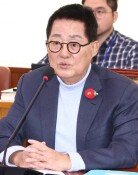Criticism of Seoul Archbishop
At an archbishops meeting in March, Seoul Archbishop Cheong Jin-suk said, "The archbishops at the meeting did not oppose the governments four-river restoration project." On this, the Catholic Disciples Group for Realizing Justice said Sunday, "Cardinal Cheong randomly distorted the decision by the archbishops meeting." Many Catholics agree with Cheongs comment that It is irrational and undesirable for the religious community to make a judgment on the four-river restoration project, which is a scientific and professional area and an issue with differing views by experts. Nevertheless, the group sarcastically said in a statement entitled Cardinal Cheongs Sophism Sunday, "We would like to ask why he has to openly take the governments side or if if anything forces him to do so."
If the Catholic group seeks to criticize the cardinal, who represents Koreas chapter of the Roman Catholic Church, which has a strict hierarchy of the pope, cardinals, archbishops and priests, it should use rational and reserved language. In its statement, the group criticized Cheong by saying, It is unfortunate for the Church since he has displayed the image of a strict anti-public figure who just incites hatred, and concluded, Your comments represent a declaration that you have audaciously given up the pastoral view of wisdom or admitted on your own that you had no such view of wisdom in the first place. To laypeople, these blunt statements effectively sound like Cheong has given up his capacity as a cardinal or is unqualified, and thus the public can hardly construe them as the language of priests. On an online journal for Catholics, one posting said, Ive never seen in my 70 years of life someone who uses such bad language against and protests a cardinal within the Catholic Church.
This is not the first time that the Catholic group has made a statement biased and crude that makes it similar to those by student demonstrators. In May following the sinking of the South Korean naval vessel Cheonan by North Koreas torpedo attack, the group also joined opposition parties and left-leaning civic organizations in saying, A hasty conclusion that lacks disclosure of clear evidence and international recognition will inevitably face global mistrust and criticism. In 2008, the group took the lead in candlelight vigils on protesting the resumption of U.S. beef imports, something which even earned harsh criticism from the late Hwang Jang-yop, the highest-ranking North Korean official to defect to the South. Hwang said, If you are truly aware of the right to life and justice, why havent you taken candles to support human rights in North Korea yet?
The group said elderly priests, including Ham Se-woong, chief of the Coalition for Commemoration of the Democratization Movement who served as head of human rights at the Korean Catholic Justice and Peace Committee, will make a statement in support of the group Tuesday. South Korea is not under dictatorial governments as it was in the 1970s or 1980s. Nevertheless, certain priests consider the incumbent government, which was elected through a democratic process, to be the same as a military government and frequently launch political struggles, a practice which looks anything but religious. South Korea is a nation where politics and religion are supposed to be completely separate under the Constitution. Religious people and the public who follow and honor the Catholic group have begun to consider the groups suggestion of realization of justice as realization of politics, which will fuel social conflict.







